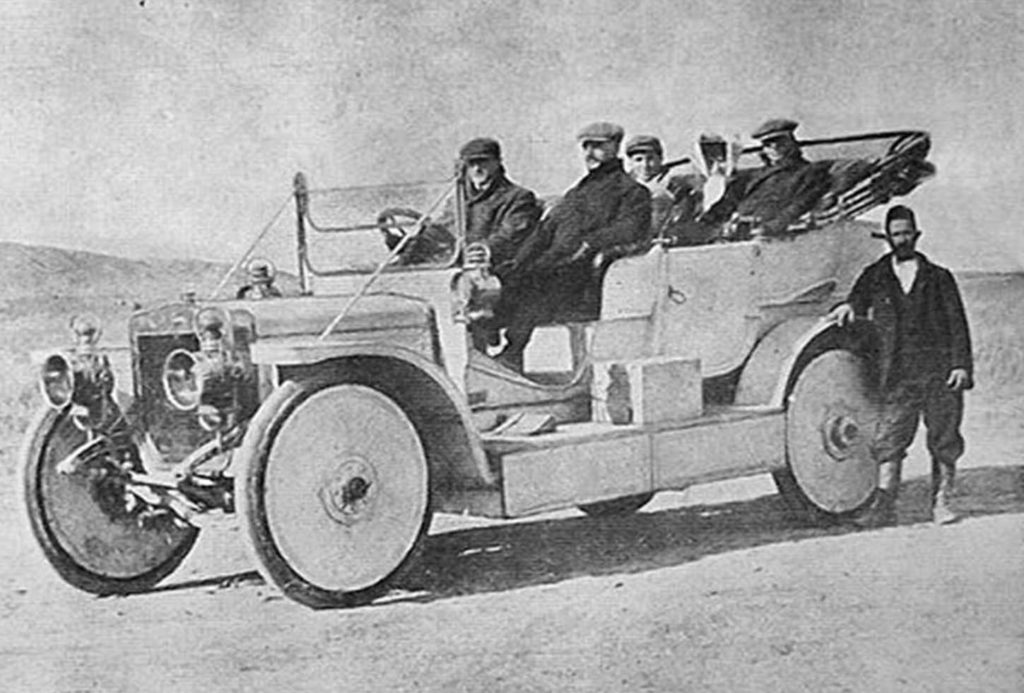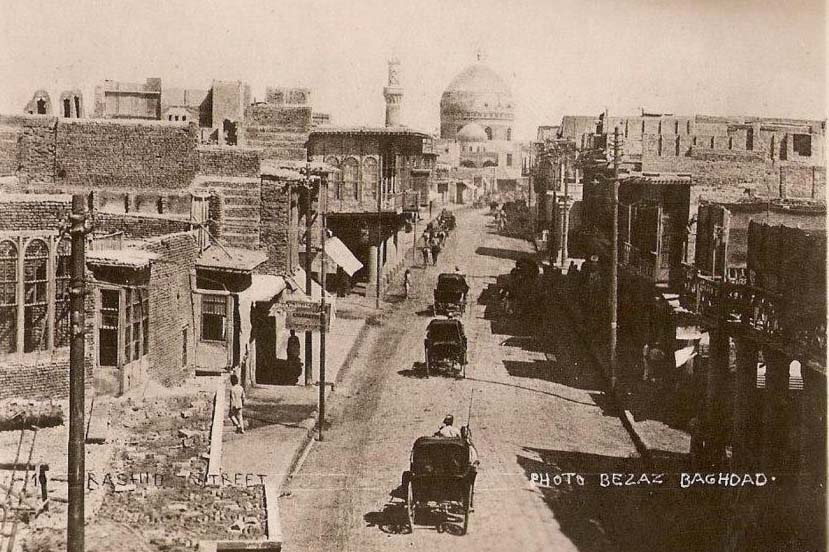
Democracy is a social right for societies who know how to deal with it and understand its laws. But in these societies democracy – much as technology, the press, education and all modern imported systems – suffers from a deficit of both of these skills.
AT THE BEGINNING of the 20th century the first motor car entered Baghdad arriving from Aleppo, and at the wheel was the Scotsman David Forbes[1]. An event like this was not an easy undertaking in a society that had been isolated from the world. The Iraqi sociologist Ali al-Wardi[2] described the arrival of this first motor car in 1908 and how the inhabitants of Baghdad came out to view it, how ‘some began to look underneath the car to uncover what they maintained was the horse hidden inside it, since it was against reason to expect that a carriage could move itself without a horse to pull it.’
This technology had to go through a lot before it could take root in any way in a society that was foreign to the one in which it was invented. The automobile is an advanced technology and was developed in appropriately advanced societies, that is to say, social development was the fellow traveller to technological development. Thus the technological requirements were available for every phase of this development. In the same way, society was in a position to accept the influences it would exert and promulgated laws designed to deal with this at every stage.
These societies suffer problems in socially acclimatizing to this technology
The presence of the motor car in Iraqi society constitutes an ‘abridgement’ of the extended phases of social and technological development, and so a sharp contradiction existed between the requirements for making a car and what was available socially and materially to do this. And this is the condition of all Arab Muslim societies, not just this Iraqi example that we have taken. The existence of a motor car in any particular society implies the provision of roads with their special requirements and traffic regulations to organise all affairs specific to this, along with institutions to provide maintenance services. All of these elements pre-suppose the existence of a developed social and technological infrastructure. Over the last century provision has duly been made for some of these material requirements – such as the means and institutions of communication, maintenance and fuel stations – but as world traffic accident statistics indicate, these societies now suffer the highest incidence of traffic accidents in the world.[3] The motorcar entered these societies at the end of the 19th century yet these same societies still suffer problems in socially acclimatizing to this technology.
There is no doubt that driving a car is the legal right of all (with the exception of some societies that withhold women this right), but the driver does have to be qualified to handle this developed technological creation. Otherwise, the right to drive would be awarded arbitrarily and this would lead to social disasters due to lack of the necessary qualifications. Rights here have to be conditional upon the possession of skill and knowledge.
But the motorcar was not the only thing to enter these societies for the first time at the beginning of the 20th century. There were very many other technologies that were equally strange to them. And not just technologies, but systems also of management, education, the military and politics and so on, systems which these societies needed. But the present state of every one of these systems is no better than that of the motorcar or of traffic accidents. All of these systems developed over centuries and in environments entirely removed from the societies that imported them. Consequently our current society’s dealings with them have been and still are at a very low, if not at times zero, level of competency. Society’s reception and handling of these systems constitutes a serious flaw in the relationship that these societies have with anything that is new.
These systems developed in environments entirely removed from the societies that imported them
The democratic system was also something that was imported. Democracy is a highly developed political system that, as in the case of technology, was accompanied by a parallel cultural and social development. Modern democracy developed over the last three centuries or so while its importation into Arab, Islamic societies began only with the fall of the Ottoman Empire, in much the same way that any developed commodity was imported. Democratic systems are many and varied but from the theoretical point of view they all depend on three basic foundations:[4]
- Upward control; that is, ultimate sovereignty resides at the lowest level of the authority structure;
- Political equality;
- Acceptable social norms consistent with the above two categories.
Democracy can only function through political parties which demonstrate specific characteristics (just as the automobile driver must possess certain characteristics), and within this system of government parties must not be allowed access to the state exchequer. Democracy was given birth to gradually in these societies and was accompanied by a development in economic and political thought. Consequently political and economic institutions operate harmoniously and not problematically.
Recently, from the year 2003, the democratic system has been imported into some Arab nations in the Middle East. It has entered these societies in much the same way of that 19th century motor car. Just as driving is a natural right for those who have the ability to steer and who recognise the rules of the road, democracy is a social right for societies who know how to deal with it and understand its laws. But in these societies democracy – much as technology, the press, education and all modern imported systems – suffers from a deficit of both of these skills. Just as the local mindset has forced anything from minor adjustments to complete destruction of some of the technological apparatus or management systems that they have imported, so also has democracy been subjected to local modifications here and there so as to tailor it to specific societal sizes.
Ignorance and cultural backwardness in these societies present a dangerous impediment to the appropriate handling of these new systems, while ideologized parties that are far from being able to grasp the spirit of modernity and its humanitarian horizons are absolutely incapable of dealing smoothly with this potentially dangerous system. In Europe democracy led to the rise of an ideological party that caused a disastrous conflict – the Second World War. Parties that can deal with the concept of democracy are far removed from totalitarian ideology, and a state governed by a democratic system is kept at a distance from the national exchequer.
This mindset is holding back the forward movement of thought and social conduct
For about 10 centuries religious thought dominated Arab Islamic societies and forced it to undergo serious setbacks and reverses, and this same mindset is holding back the forward movement of thought and social conduct. For this reason religious parties, with their politicization of religion, will inevitably dominate any democratically structured parliament and monopolise the national resources. Most of these politico-religious formations demonstrate the following characteristics:
– An inability to accept or deal with contemporary structures that influence society such as human rights, individual freedom and women’s freedom. If they do accept them it is only begrudgingly;
– An absolute inability to deal with science and scientific thought;
– An understanding of modernity as amounting to nothing more than the employment of technologies;
– A conception of human society as being little more than a ‘flock’ that must be made to submit to tendentious interpretations of religion;
– A belief that any problems, be they ever so complex, are to be solved through studying the nearest historical analogy. History (a basically imprecise art) is the yardstick, since time is considered to have come to a halt at around the 10th century;
– The employment of a method that takes no account of the wishes of society with practices designed to lay the foundations for their ideology, and not the Islamic faith;
– A tendency to exercise dominion over the institutions of society.
A mindset represented by these characteristics is as far removed as you could possibly get from modernity and the elements that have gone into building it. Democracy is just one of these elements. But gaining modern power nonetheless requires a means, so that democracy comes to be dealt with according to the third category mentioned above, as if it constituted no more than a means to an end.
This is disastrous. Democracy is not a means for gaining power so much as a method to guarantee the peaceful rotation of power and manage the development of society in a manner that remains smooth and uninterrupted throughout the changes that occur over time. Seeking to attain to power is a legitimate right. But in the case of anyone unaware of how to employ this authority – it is as if you were giving those unable to steer or handle a vehicle permission to drive.
[1] D. Forbes, ‘The Journey through Arabia’, Progress, p. 297, July 1909. http://paperspast.natlib.govt.nz/cgi-bin/paperspast?a=d&d=P19090701.2.9.3&l=mi&e=——-10–1—-0-all .
[2] Alī al-Wardī, لمحات اجتماعية من تاريخ العراق الحديث p.240.
[3] http://www.worldlifeexpectancy.com/cause-of-death/road-traffic-accidents/by-country/.
[4] Richard Kimber, ‘On democracy’, Scandinavian Political Studies, 12 (3), 201 (1989). https://tidsskrift.dk/index.php/scandinavian_political_studies/article/view/13057/24875



